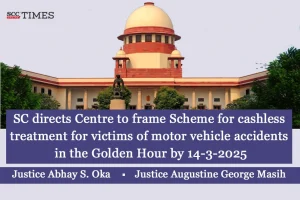Supreme Court: While dealing with the issue of cashless treatment for the victims of motor vehicle accidents; the Division Bench of Abhay S. Oka* and Augustine George Masih, JJ., directed the Central Government to make a scheme in terms of Section 162(2) of the Motor Vehicles Act, 1988 (MV Act) as expeditiously as possible and, in any event, by 14-3-2025. No further time shall be granted.
The Court strictly noted that the provision made in Section 162, the MV Act for framing a scheme for providing cashless treatment in the golden hour seeks to uphold and protect the right to life guaranteed by Article 21 of the Constitution. Moreover, it is a statutory obligation of the Central Government to frame the scheme. More than reasonable time was available to the Central Government to frame the scheme under Section 162(2). Once the scheme is framed and its implementation starts, it will save the lives of several injured persons who succumb to injury simply because they do not receive requisite medical treatment during the golden hour.
Deliberating over the issue, the Court took note of Section 2(12-A) of the MV Act and pointed out that one hour following a traumatic injury suffered in a motor accident is the most crucial hour and hence has been defined as the Golden Hour. In many cases, if required medical treatment is not provided within the golden hour, the injured may lose his life. Section 162 of the MV Act is crucial in the present scenario where motor accident cases are ever-increasing.
The Court further pointed out that when a person gets injured in a motor accident, their near and dear ones may not be around; therefore, there is no one to help. However, the injured person must receive the required medical treatment in the golden hour, since it is essential for survival. “Every human life is precious. Despite this, we find that the treatment needed in the golden hour is denied due to various reasons. The hospital authorities sometimes wait till the arrival of the police. They are always worried about the payment of charges for the treatment, which in a given case can be on higher side. That is a reason why Section 162(1), which starts with a non-obstante clause, provides that the insurance companies carrying on general insurance business in India shall provide for the treatment of road accident victims, including during golden hour in accordance with the scheme made under the MV Act”.
The Court further said that it is the obligation of the Central Government under Section 162(2) to make a scheme for cashless treatment of accident victims during the golden hour. It was pointed out that Central Motor Vehicles (Motor Vehicle Accident Fund) Rules, 2022 were framed to give effect to Section 164-B of the MV Act and a fund had been created that will be available to provide cashless treatment in golden hour in accordance with Section 162 of the MV Act. However, the enactment of Section 164-B and the Central Motor Vehicles (Motor Vehicle Accident Fund) Rules, 2022, will serve no purpose unless the Central Government comes out with a scheme. The Court took strict note of the emergent scenario wherein Section 162, which incorporates the obligation on part of the Central Government to make a scheme for cashless treatment of victims of accidents during the golden hour and Section 164-B, which provides for the creation of motor vehicle accident fund, were brought on the statute book from 1-4-2022. However, the scheme has not seen the light of the day.
Furthermore, taking note that 921 claims were pending as of 31-7-2024, as there were deficiencies in the documents submitted, the Court directed GIC to process the claims on the basis of the 7 documents listed by it before the Amicus Curiae.
The Court also directed the Central Government that a copy of the Scheme framed under Section 162(2) of the MV Act must be placed on record on or before 21-3-2025, together with an affidavit of the concerned officer of the Ministry of Road Transport and Highways explaining the manner in which the scheme will be implemented.
CASE DETAILS
|
Citation: Appellants : Respondents : |
Advocates who appeared in this case For Petitioner(s): For Respondent(s): |
CORAM :

